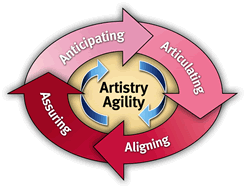Study results
Our overall conclusion is that successful leaders use the three strategic thinking skills more often than less successful leaders. Several studies have been completed. Pisapia, Reyes-Guerra, and Yasin studied 138 for-profit and not-for-profit managers and executives. Pang and Pisapia conducted a study of 543 school principals in Hong Kong. Pisapia, Reyes-Guerra, Zsiga studied 540 YMCA directors in the United States. Pisapia, Pang, Fatt and Ling studied 328 students preparing for educational management roles in Hong Kong, Malaysia, Shanghai and the United States. Five major impressions were left from statistical analyses presented in these studies.
- Strategic thinking is strongly associated with self reported effectiveness. Supervisors and managers in our samples score lower than the executives as expected. However, the high performers (the top 20% on effectiveness scores) in each management category used these mental skills significantly more often than less successful managers.
- There is a cumulative impact when the three capabilities which form the strategic thinking construct are used. The strength of the relationship between strategic thinking and leader success increases as leaders use the three dimensions in tandem.
- There is a significant relationship between the use of strategic thinking skills and self directed learning.
- The STQ appears free of cultural and gender bias; but reveals an age bias.
- The use of these skills improves with age, experience, and education– the younger you are the less you use these skills.
- Strategic thinking skills can be developed through training that encourages a more open and complex mindset.
We believe that the results are useful for the development and identification of managerial and executive talent. From an organizational point of view, the STQ can provide another tool to use in considering who gets selected and placed on the fast-track. From the participant point of view, it provides him/her with the necessary feedback for their continuous development on an important and hereto untouched set of skills. We have worked in the following ways in using the instrument.
Executive development – we administer the test as a pre-test and then provide training seminars in strategic thinking. (Ritz-Carlton (local) and Playtex). A professional development firm, Sherwood Learning in the USA, is among our users.
Executive identification – we have been approached by A.P. Moller - Maersk (a top 200 company globally with 120.000 employees) who hopes to use the results to identify the top 1000 executives of the future.

